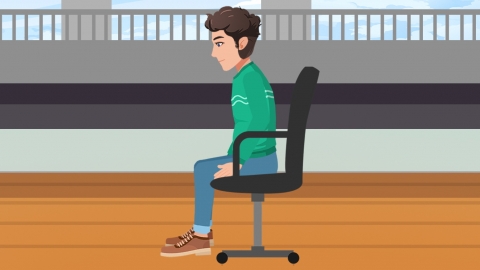What causes numbness in the buttocks after sitting for a while?
In general situations, buttock numbness after sitting for a while may be caused by prolonged maintenance of a single posture, poor posture, sciatica, multiple sclerosis, lumbar myofascial inflammation, or other related factors. Symptomatic management through general treatment and medication may be necessary. If discomfort persists, it is recommended to seek timely medical attention and undergo appropriate treatment under a doctor's guidance. Detailed analysis is as follows:

1. Prolonged maintenance of a single posture
Remaining seated for extended periods without movement, especially on hard surfaces, can lead to continuous pressure on the buttocks, compressing local nerves and impairing blood circulation, resulting in numbness. This is usually not accompanied by other symptoms and can be relieved by standing up and moving around. It is recommended to get up and move periodically and adjust sitting posture.
2. Poor posture
Crossing legs or incorrect sitting posture may compress nerves, causing buttock numbness. Poor posture might also be accompanied by lower back discomfort and impaired circulation in the lower limbs. Regularly changing sitting positions, avoiding prolonged immobility, getting up periodically to perform simple stretching exercises can help improve blood circulation.
3. Sciatica
Sciatica may result from lumbar spine disorders, intervertebral disc herniation, scoliosis, or other conditions that compress or damage the sciatic nerve, disrupting normal nerve signal transmission and causing numbness in the buttocks. It may also be accompanied by leg pain and muscle weakness. It is recommended to follow medical advice to use medications such as carbamazepine tablets, gabapentin tablets, or phenytoin sodium tablets to alleviate symptoms.
4. Multiple sclerosis
Multiple sclerosis is a chronic inflammatory disease of the central nervous system in which the immune system attacks the myelin sheath, leading to impaired nerve conduction and causing symptoms such as limb numbness and weakness. It may also affect the buttocks and may be accompanied by visual disturbances, limb weakness, and balance disorders. It is recommended to undergo treatment under a doctor's guidance using medications such as recombinant human interferon beta-1b for injection, glatiramer acetate injection, or dimethyl fumarate enteric-coated capsules.
5. Lumbar myofascial inflammation
Lumbar myofascial inflammation is an aseptic inflammation of muscles and fascia, commonly caused by fatigue, trauma, cold exposure, or other factors. Persistent or recurrent inflammation can stimulate muscle and fascia spasms, leading to buttock numbness, which may be accompanied by lower back pain and stiffness. It is recommended to follow medical advice to use medications such as eperisone hydrochloride tablets, celecoxib capsules, or meloxicam capsules for treatment.
When experiencing buttock numbness, avoid prolonged sitting. Stand up and move around, gently moving the hips to promote blood circulation.




